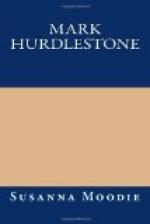He determined to see his father for the last time, and if he failed in moving his compassion, he had formed the desperate resolution of putting an end to his own life in his presence; a far greater crime than that for which he dreaded receiving a capital punishment.
“Clary,” he said, hastily thrusting the letter into his pocket, “business of importance calls me away to-night. Do not be alarmed if I should be detained until the morning.”
“You cannot go to-night, Anthony. It has rained all the afternoon; the ground is wet. The air is raw and damp. You are not well. If you leave the house you will take cold!”
“Do not attempt to detain me, Clary, I must go. I shall leave a letter for your brother on the table, which you must give him if I do not return.”
“Something is wrong. Tell me, oh, tell me what it is!”
“You will know all to-morrow,” said Anthony, greatly agitated. “I cannot speak of it to-night.” He took her hand and pressed it sadly to his heart. “Should we never meet again, dear Clary, will you promise to think kindly of me; and in spite of the contempt of the world, to cherish your cousin’s memory?”
“Though all the world should forsake you, yet will I never desert you,” sobbed Clary, as, sinking into his extended arms, she fainted on his breast.
“This will kill you, poor innocent. May God bless and keep you from a knowledge of my guilt.” He placed her gently upon the sofa, and kissed her pale lips and brow, and calling Ruth to her assistance, sought with a heavy heart his own chamber.
He sat down and wrote a long letter to Frederic, explaining the unfortunate transaction which had occurred during his absence. This letter he left upon the study table, and putting a brace of loaded pistols into his pocket he sallied out upon his hopeless expedition.
It had been a very wet afternoon. The clouds had parted towards nightfall, and the moon rose with unusual splendor, rendering every object in his path as distinctly visible as at noonday. The beauty of the night only seemed to increase the gloom of Anthony Hurdlestone’s spirit. He strode on at a rapid pace, as if to outspeed the quick succession of melancholy thoughts, that were hurrying him on to commit a deed of desperation. He entered the great avenue that led up to the back of the Hall, and past the miser’s miserable domicile, and had traversed about half the extent of the darkly shaded path, when his attention was aroused by a tall figure leaning against the trunk of a large elm tree. A blasted oak, bare of foliage, on the opposite side the road, let in a flood of light through its leafless branches, which shone full upon the face of the stranger, and Anthony, with a shudder, recognised William Mathews.
“A fine evening for your expedition, Mr. Hurdlestone. It might well be termed the forlorn hope; however I wish with all my heart that you may be successful.” As he spoke he lowered a fowling-piece from his shoulder to the ground. “Do you hear that raven that sits croaking upon the rotten branch of the old oak opposite? Does not his confounded noise make you nervous? It always does me. It sounds like a bad omen. I was just going to pull down at him as you came along. I fancy, however, that he’s too far above us for a good shot.”




